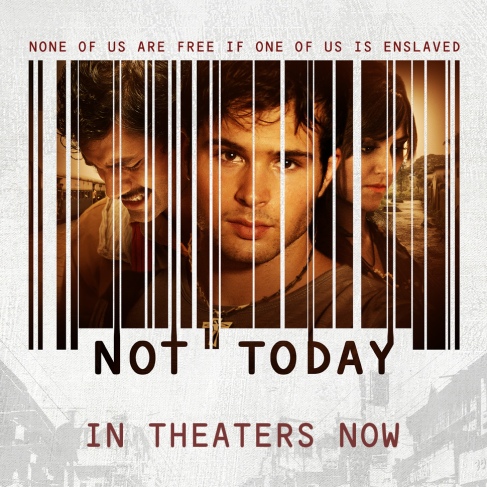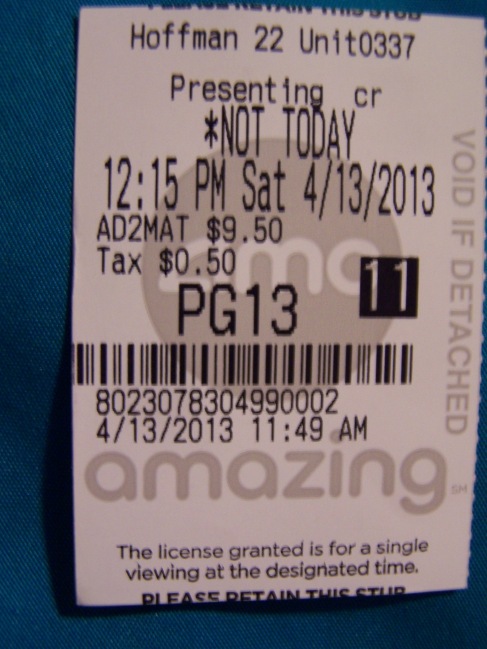This past weekend, I was able to see the movie Not Today. This is a film that focuses on the oppression of the Dalits (the “Untouchables” caste) in India and on human trafficking.
 “None of us are free if one of us is enslaved.”
“None of us are free if one of us is enslaved.”
Because I lived in India for almost two years, and because I’m very interested in the problem of human trafficking and how we can eradicate it, I really wanted to see the movie. It was only showing in selected theaters across the country, and the closest one to my hometown was near Washington, DC. So, my wonderful boyfriend drove me 3 hours one-way to Alexandria so we could watch the film the weekend it opened.
 my wonderful boyfriend
my wonderful boyfriend
The basic storyline is this: Caden–a rich, entitled, American young man–and his friends decide on a whim to travel to India, where they plan to spend time visiting the Taj Mahal, beaches, and exotic girls. Caden’s mother approves the trip, hoping it will open his eyes to the wider world and show him exactly how blessed his materialistic life is. Soon after arriving in the country, Caden is approached by Kiran, an umployed Dalit man, and his daughter Annika. While Caden’s friends are drinking and meeting girls, Caden is busy trying to convince a very hungry Kiran and Annika to leave him alone and find food and help elsewhere. After crossing paths with Kiran and Annika several times, Caden finally promises to help them, then promptly disappears. After Caden experiences a falling-out with his friends, he begins feeling guilty for not returning to help Kiran and his daughter. When he seeks them out, he finds that Kiran has sold Annika, believing a man who said he could find her a better life as a maid to a rich family. Caden is astonished and angry that someone would sell his own child, not understanding Kiran’s motivation to provide his daughter with the opportunity to gain an education and escape the oppression that is often the daily lot of those of the Dalit caste. When Caden discovers that many girls in this situation end up as domestic slaves or in prostitution, he is overwhelmed by the reality of human trafficking and by the thought that such a fate could have been avoided for Annika if he had only given the help he promised. The remainder of the film is spent following Caden and Kiran on a quest across India as they attempt to track down Annika and rescue her from an unthinkable fate, with Caden’s girlfriend and parents checking in every so often to offer encouragement from home.
Based on my experiences, the film was fairly accurate both in its portrayal of poverty in South Asia and of human trafficking. However, it did not contain the emotional aspect I was expecting. Perhaps there was very little “shock factor” for me because I have experienced life in India and because I do already know a good bit about human trafficking. Maybe the very reasons I was so looking forward to the movie were the same reasons that left me feeling more was to be desired. I was expecting–perhaps even hoping for–a pretty big tug on my heartstrings, but it never happened. My eyes didn’t even tear up, and I nearly always cry at movies. Have I become desensitized by the things I’ve already seen and heard that relate to the message of this movie? Do I know too much about the real things to be shocked or saddened or angered or disgusted at what I know to be a fictionalized account? Or was the film really that lacking in emotional content? In my opinion, one of the main reasons for creating a film about human trafficking would be to spur people to action, but I just didn’t feel that this movie made the problem seem all that urgent. Perhaps the reason for that was the fact that this is one of the least graphic films about human trafficking I’ve ever seen. There was no scene that showed (or even heavily hinted at) what atrocities these girls were experiencing; the exploitation wasn’t made very obvious. This could very well be an attempt on the part of the writers and producers to create a film that would be watched by a myriad of people, therefore encouraging a myriad of people to get involved in the fight. However, I didn’t feel that it portrayed exactly how horrendous human trafficking is.
Another thing that bothered me about Not Today was the very forced-feeling Christianity of the movie. I absolutely believe that Jesus calls his followers to reach out to the oppressed and to seek justice and freedom for the captive, but I wasn’t convinced the characters in the film believed that. While Caden struggles with faith, his girlfriend, mother, and step-father all seem almost unwavering in theirs, but I don’t think that’s realistic. His girlfriend, especially, seemed to somehow have all the right answers. When he called to say that he was making his way all over a third-world country in order to recuse one girl out of millions from a hierarchy of underground criminals, she had the perfect religious platitudes to offer from the safety of her own bed in her own culture. If he would just trust God, he would see that he was there “for such a time as this.” While I don’t think this is a wrong thing to say or a wrong idea, I felt that it wasn’t very helpful considering all the circumstances at the time. Her words made it sound like Caden wasn’t trying hard enough, that if he only had faith, Christianity and life would be easy. Anyone who truly strives to follow Jesus knows how untrue that is! I often find myself frustrated by Christian arts because a) they are very often not a good quality of work (that’s a post for another day) and b) they seem to tell the lie that a relationship with Jesus will solve every problem. God doesn’t allow us to bypass life’s problems; he takes our hand and walks through them with us.
Despite those few things that irked me, Not Today does many things well. It brings the issue of human trafficking to a society that desperately needs to pay attention and do something about it. It shows the heartbreaking realities of life for Dalits in India. Although a bit skewed in my opinion, it does bring the message of Christ to a larger audience in a way that may speak to someone who enters a movie theater more often than a church sanctuary. In other words, it brings awareness on a variety of topics which we should be considering. If you don’t know much about human trafficking or about life in India, this film is definitely a great place to start learning. If you’re interested in seeing a movie that focuses on the intersection of life and faith, you would probably enjoy this one. Do I think the film could have been improved? Yes. Do I regret going all that way to see it? Absolutely not. In my mind, the bottom line is this: A movie that brings attention to modern-day slavery and that helps to rescue and rehabilitate those affected by it is definitely a successful endeavor, and Not Today definitely accomplishes those tasks. Watch the trailer and find the closest theaters and showtimes here.
 “Your ticket in is their ticket out.”
“Your ticket in is their ticket out.”

